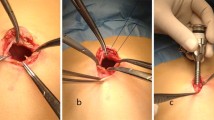Abstract
Background
Laparoscopic repair of umbilical hernias is usually based on the open underlay procedure in which the mesh is placed intra-abdominally. To prevent complications such as adhesions, bowel obstruction and fistula formation we developed a new laparoscopic approach, placing the mesh in the preperitoneal space.
Methods
Our laparoscopic approach concerns a standardised procedure with introduction of three intra-abdominally placed trocars. The ventral abdominal wall is incised in a lengthwise manner approximately 5 cm from the umbilical defect, followed by development of the preperitoneal space, reposition of the umbilical peritoneal sac and placement and fixation of a ProleneTM mesh. The mesh is secured using transfascial ProleneTM sutures; the peritoneal defect is closed with a running VicrylTM suture. Data on 17 patients with primary umbilical hernias laparoscopically operated on between April 2002 and March 2006 are presented.
Results
The 11 men and 6 women had a mean age of 57.8 years (range 37–91 years) and a mean body mass index (BMI) of 30.6 kg/m2 (range 23.7–37.9 kg/m2). Mean hernia size was 1.95 cm (range 1–3 cm), average mesh size was 110 cm2 (range 100–150 cm2). Mean operating time was 85.6 min (range 60–120 min). Mean hospital stay was 2.2 days (range 1–3 days). No major complications were seen. No recurrences were observed during a mean follow-up of 36.2 months (range 13–62 months).
Conclusions
The preperitoneal laparoscopic technique for umbilical hernia repair combines the advantages of a laparoscopic, minimally invasive, approach, avoiding the potential complications related to intra-abdominal mesh position.





Similar content being viewed by others
References
Velasco M, Garcia-Urena MA, Hidalgo M, Vega V, Cohen M, Carnero FJ (1999) Current concepts on adult umbilical hernia. Hernia 3:233–239
Jackson OJ, Moglen LH (1970) Umbilical hernia. A retrospective study. Calif Med 113:8–11
Arroyo A, García P, Pérez F, Andreu J, Candela F, Calpena R (2001) Randomized clinical trial comparing suture and mesh repair of umbilical hernia in adults. Br J Surg 88:1321–1323
Hjaltason E (1981) Incarcerated hernia. Acta Chir Scand 147:263–267
Kulah B, Kulacoglu IH, Oruc MT, Duzgun AP, Moran M, Ozmen MM, Coskun F (2001) Presentation and outcome of incarcerated external hernias in adults. Am J Surg 181:101–104
Burger JW, Luijendijk RW, Hop WC, Halm JA, Verdaasdonk EG, Jeekel J (2004) Long-term follow-up of a randomized controlled trial of suture versus mesh repair of incisional hernia. Ann Surg 240:578–585
Eryilmaz R, Sahin M, Tekelioglu MH (2006) Which repair in umbilical hernia of adults: primary or mesh? Int Surg 91:258–261
Luijendijk RW, Hop WC, van den Tol MP, de Lange DC, Braaksma MM, IJzermans JN, Boelhouwer RU, de Vries BC, Salu MK, Wereldsma JC, Bruijninckx CM, Jeekel J (2000) A comparison of suture repair with mesh repair for incisional hernia. N Engl J Med 343:392–398
Sanjay P, Reid TD, Davies EL, Arumugam PJ, Woodward A (2005) Retrospective comparison of mesh and sutured repair for adult umbilical hernias. Hernia 9:248–251
Halm JA, Heisterkamp J, Veen HF, Weidema WF (2005) Long-term follow-up after umbilical hernia repair: are there risk factors for recurrence after simple and mesh repair. Hernia 9:334–337
Goodney PP, Birkmeyer CM, Birkmeyer JD (2002) Short-term outcomes of laparoscopic and open ventral hernia repair: a meta-analysis. Arch Surg 137:1161–1164
Heniford BT, Park A, Ramshaw BJ, Voeller G (2003) Laparoscopic repair of ventral hernias: nine years’ experience with 850 consecutive hernias. Ann Surg 238:391–400
Lau H, Patil NG (2003) Umbilical hernia in adults. Surg Endosc 17:2016–2020
McGreevy JM, Goodney PP, Birkmeyer CM, Finlayson SR, Laycock WS, Birkmeyer JD (2003) A prospective study comparing the complication rates between laparoscopic and open ventral hernia repairs. Surg Endosc 17:1778–1780
Nguyen NT, Lee SL, Mayer KL, Furdui GL, Ho HS (2000) Laparoscopic umbilical herniorrhaphy. J Laparoendosc Adv Surg Tech A 10:151–153
Wright BE, Beckerman J, Cohen M, Cumming JK, Rodriguez JL (2002) Is laparoscopic umbilical hernia repair with mesh a reasonable alternative to conventional repair? Am J Surg 184:505–509
Yavuz N, Ipek T, As A, Kapan M, Eyuboglu E, Erguney S (2005) Laparoscopic repair of ventral and incisional hernias: our experience in 150 patients. J Laparoendosc Adv Surg Tech A 15:601–605
Balique JG, Benchetrit S, Bouillot JL, Flament JB, Gouillat C, Jarsaillon P, Lepère M, Mantion G, Arnaud JP, Magne E, Brunetti F (2005) Intraperitoneal treatment of incisional and umbilical hernias using an innovative composite mesh: four-year results of a prospective multicenter clinical trial. Hernia 9:68–74
Losanoff JE, Richman BW, Jones JW (2002) Entero-colocutaneous fistula: a late consequence of polypropylene mesh abdominal wall repair: case report and review of the literature. Hernia 6:144–147
Knook MT, van Rosmalen AC, Yoder BE, Kleinrensink GJ, Snijders CJ, Looman CW, van Steensel CJ (2001) Optimal mesh size for endoscopic inguinal hernia repair: a study in a porcine model. Surg Endosc 15:1471–1477
Mayo WJ (1901) An operation for the radical cure of umbilical hernia. Ann Surg 34:276–280
Arroyo Sebastián A, Pérez F, Serrano P, Costa D, Oliver I, Ferrer R, Lacueva J, Calpena R (2002) Is prosthetic umbilical hernia repair bound to replace primary herniorrhaphy in the adult patient? Hernia 6:175–177
Miserez M, Penninckx F (2002) Endoscopic totally preperitoneal ventral hernia repair. Surg Endosc 16:1207–1213
Jarsaillon P (2000) Laparoscopic treatment of an umbilical hernia using a new composite mesh. Hernia 4:S17–S21
DeMaria EJ, Moss JM, Sugerman HJ (2000) Laparoscopic intraperitoneal polytetrafluoroethylene (PTFE) prosthetic patch repair of ventral hernia. Prospective comparison to open prefascial polypropylene mesh repair. Surg Endosc 14:326–329
Schumacher OP, Peiper C, Lörken M, Schumpelick V (2003) Long-term results after Spitzy’s umbilical hernia repair. Chirurg 74:50–54
Kurzer M, Belsham PA, Kark AE (2004) Tension-free mesh repair of umbilical hernia as a day case using local anaesthesia. Hernia 8:104–107
Author information
Authors and Affiliations
Corresponding author
Rights and permissions
About this article
Cite this article
Hilling, D.E., Koppert, L.B., Keijzer, R. et al. Laparoscopic correction of umbilical hernias using a transabdominal preperitoneal approach: results of a pilot study. Surg Endosc 23, 1740–1744 (2009). https://doi.org/10.1007/s00464-008-0177-5
Received:
Accepted:
Published:
Issue Date:
DOI: https://doi.org/10.1007/s00464-008-0177-5




